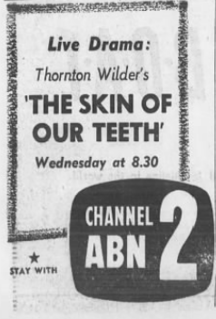Related Research Articles
The Torrents is a 1955 Australian play by Oriel Gray, set in the late 19th century, about the arrival of a woman journalist in an all-male newspaper office, and an attempt to develop irrigation-based agriculture in a former gold mining town.
Swamp Creatures is a play by the Australian author Alan Seymour. He wrote it for radio, stage and TV. It was Seymour's first produced play.

"The Air Conditioned Author" was an episode of the television anthology drama Australian Playhouse. Australian TV drama was relatively rare at the time.
Australian Plays is a 1969 Australian anthology TV drama series that aired on the ABC. It consisted of six original Australian dramas.

The Skin of Our Teeth is a 1959 Australian television play based on the play by Thorton Wilder. It starred John Ewart.
The Five Sided Triangle is a 1967 television play broadcast by the Australian Broadcasting Corporation. It was the last in the Australian Playhouse series and was based on a script by Brian Faull. Australian TV drama was relatively rare at the time.
The Third Witness is a 1966 television play broadcast by the Australian Broadcasting Corporation. It was part of Wednesday Theatre. Australian TV drama was relatively rare at the time.
Burst of Summer is a 1959 play by Oriel Gray. It won the 1959 J.C. Williamson's Little Theatre Guild Award, and was later adapted for radio and TV. It was Gray's last produced play.

Dark Under the Sun is a 1960 Australian TV play. It was written by Brisbane author, Chris Gardner, who also wrote The House of Mancello (1962) and A Private Island (1964). Australian TV drama was relatively rare at the time. The play concerned an interracial romance which led Filmink magazine to think it was "an indication that Australian television was willing to confront some of the nation’s trickier social issues head on." Other Australian TV plays to deal with racial issues included Burst of Summer. However the Aboriginal character is played by a white actor in blackface.
Macbeth is a 1960 Australian TV film based on the play by William Shakespeare. It was directed by William Sterling. Australian TV drama was relatively rare at the time.

Nude with Violin is a 1964 television play broadcast by the Australian Broadcasting Corporation based on the play Nude with Violin by Noël Coward. It was directed by Christopher Muir. Australian TV drama was relatively rare at the time.
A Rose without a Thorn is a 1958 Australian television play about King Henry VIII's marriage to Catherine Howard. It was directed by Alan Burke from a play by Clifford Bax. The play was shown live in Sydney, recorded, then shown in Melbourne.
The Taming of the Shrew is a 1962 Australian television play, adapted by Alan Burke from the play by William Shakespeare. It stars Ron Haddrick and Brigid Lenihan. Australian TV drama was relatively rare at the time.
The Prodigal Son is a 1962 Australian television production of an opera by Debussy. It was directed by Christopher Muir.
She is a 1967 Australian television play. It was a filmed ballet set in an Antarctic base. It screened as part of Wednesday Theatre.

The Prisoner is a 1962 Australian television play based on a play which had been filmed with Alec Guinness. Many Australian TV dramas at the time were based on overseas stories.
The End Begins is a 1961 Australian television play shot in ABC's Melbourne studios. Like many early Australian TV plays it was based on an overseas script. It was a rare Australian TV play with a science fiction theme and a black lead actor.
A Ride on the Big Dipper is a 1967 Australian television play. It screened as part of Wednesday Theatre and had a running time of one hour. Australian TV drama was relatively rare at the time.

The Emperor Jones is a 1960 Australian TV play based on the play The Emperor Jones by Eugene O'Neill. It starred Joe Jenkins, a dancer who was living in Australia. He played a triple role.
Voyage Out is a 1969 Australian TV play. It aired as part of the Australian Plays anthology series on the ABC.
References
- ↑ "TV Guide". Sydney Morning Herald. 8 December 1969. p. 19.
- 1 2 Kelly, Frances (11 December 1969). "Television. A play at last!". The Canberra Times. Canberra, ACT, Australia. p. 33. Retrieved 11 August 2019.
- ↑ Vagg, Stephen (15 November 2020). "The Flawed Landmark: Burst of Summer". Filmink.
- ↑ Vagg, Stephen (February 18, 2019). "60 Australian TV Plays of the 1950s & '60s". Filmink.
- ↑ "Drama Sheds Mothballs". The Age. 23 October 1969. p. 45.
- ↑ Robinson, Fred (24 September 1969). "This is the place for a village". TV Times. p. 4.
- ↑ "TELEVISION". The Canberra Times . 44 (12, 490). Australian Capital Territory, Australia. 11 December 1969. p. 33. Retrieved 18 February 2019– via National Library of Australia.